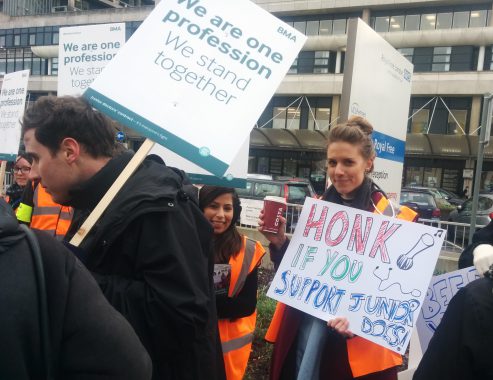The BMA has announced it is launching a judicial review over what is calls the ‘embarrassing’ revelation that the Government failed to carry out an equality impact assessment before imposing a new contract on junior doctors in England.
It has also announced three more 48-hour strikes in March and April, during which junior doctors will only provide emergency care.
Junior doctor leaders said that the failure to undertake an equality impact assessment was ’yet another example of the incompetence which the Government has demonstrated throughout its handling of this dispute’.
Health secretary Jeremy Hunt this month announced that he was imposing a contract on junior doctors after talks broke down over the issue of evening and weekend pay, with the Government refusing to step back from its decision to remove ‘unsociable hours’ pay premiums from Saturdays and weekday evenings.
The BMA had said it was looking into the legality of the imposition in an email to junior doctors over the weekend, adding that further strike action was ’inevitable’.
It has announced the dates of the new action. They are:
- 48-hour emergency care only from 8am, Wednesday 9 March to 8am, Friday 11 March
- 48-hour emergency care only from 8am, Wednesday 6 April to 8am, Friday 8 April
- 48-hour emergency care only from 8am, Tuesday 26 April to 8am, Thursday 28 April.
It also revealed that the Government had ‘failed to provide evidence’ that it had had any due regard for equality issues when imposing the contract, as required under the Equality Act 2010.
Dr Johann Malawana, BMA junior doctor committee chair, said: ’In recent weeks I have heard from thousands of junior doctors across the country, and the resounding message is that they cannot and will not accept what the Government is trying to do.
’It now appears that in trying to push through these changes the Government failed to give proper consideration to the impact this contract could have on junior doctors. This is yet another example of the incompetence which the Government has demonstrated throughout its handling of this dispute.’
He added: ’The Government can avert this action by re-entering talks with the BMA and addressing the outstanding issues and concerns junior doctors have, rather than simply ignoring them.
’If it pushes ahead with plans to impose a contract that junior doctors have resoundingly rejected we will be left with no option but to take this action. The Government must put patients before politics, get back around the table and find a negotiated solution to this dispute.’
A Department of Health spokesperson said: ‘Further strike action is completely unnecessary and will mean tens of thousands more patients face cancelled operations – over a contract that was 90% agreed with the BMA and which senior NHS leaders including Simon Stevens have endorsed as fair and safe. The new contract will mean an average 13.5% basic pay rise, and will bring down the maximum number of hours doctors can work.
‘We urge junior doctors to look at the detail of the contract and the clear benefits it brings.’
What the contract includes
The junior doctor contract imposed by health secretary Jeremy Hunt includes:
- An increase in basic pay of 13.5%;
- Redefining the definition of ‘plain time’ to include Saturday from 7am to 5pm;
- Paying a premium of 30% for Saturday ‘plain time’ working, if the doctor works one in four weekends;
- Reduce the definition of ‘safe hours’ from 91 to 72 hours a week;
- Doctors will not work more than four consecutive nights – down from seven currently;
- The maximum number of consecutive ‘long days’ will be reduced from seven to five;
- A new ‘Guardian’ role will be introduced, with the authority to impose fines for breaches to agreed working hours, which will be invested in educational resources and facilities for trainees.
Pulse October survey
Take our July 2025 survey to potentially win £1.000 worth of tokens















